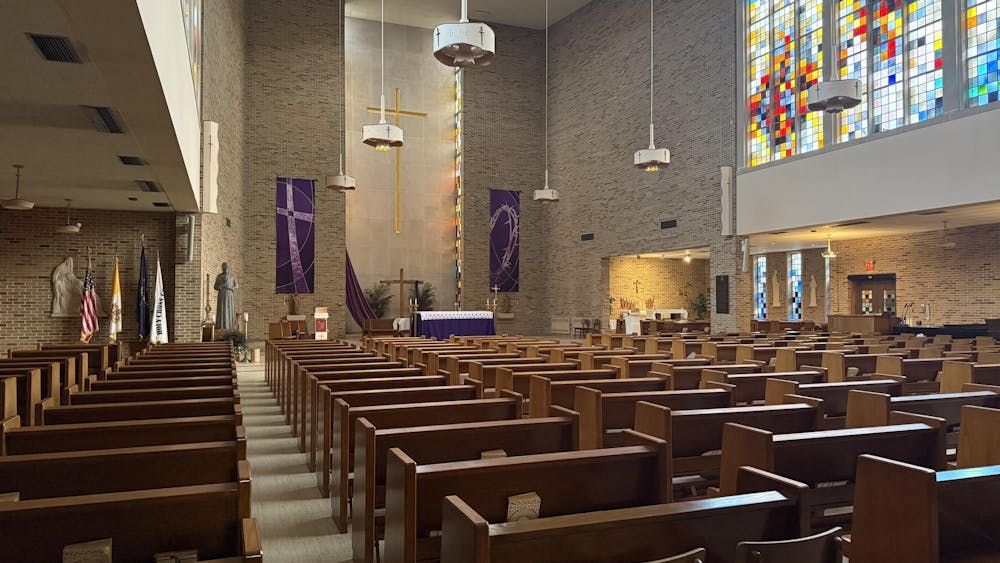Although Notre Dame is a primarily Holy Cross institution, it is home to a handful of Jesuit priests who believe the two missions align well enough to live, work and attend classes.
The Society of Jesus — the official name of the Jesuits — began ministry at Notre Dame’s location in the 17th century, and built the original log chapel which Fr. Edward Sorin later used with his Holy Cross brothers when he founded Notre Dame in 1842.
However, the community of five Jesuit priests who currently live on campus came to South Bend more recently.
Fr. Brian Daley, a Jesuit priest, first arrived at Notre Dame as a professor of theology in 1996 as a founding member of the community which today lives in a house adjacent to campus.
Besides Daley, the current community consists of four Jesuit priests pursuing their doctorates in the fields of philosophy and theology.
Even though Notre Dame is not an institution directly associated with the Society of Jesus, the Jesuit community sends young priests pursuing degrees to obtain advanced degrees in the University’s prestigious theology and philosophy departments.
“The idea is they want us to get the very best degrees, to be in the very best programs that we could possibly get into,” said Fr. John Peck, a philosophy student.
Capitalizing on the opportunity to gain the best education is what inspired the Society to originally found the community, Daley said.
“They would be less inclined to send a guy here who has been recently ordained, who is fairly young, if there weren’t a community of some sort to put them in,” he said.
The five priests each lead independent lives, and only interact in passing during the day. They come together in the evening to celebrate Mass every day at 6:30, which is followed by dinner.
The priests take turns preaching at Mass and cooking dinner. While Fr. Michael Magree, a theology student, said all the priests are apt cooks, both he and Peck acknowledged Daley is the top chef in the house.
After dinner, the priests remain to relax and socialize. They often talk about their days, watch sports or discuss philosophy and theology.
“We’re sort of nerds,” Peck said. “A lot of what we do is exchange ideas about our fields.”
While the communal activities of the household may seem mundane, the presence of the community holds great significance for all the priests.
Daley spoke about how — though he loves Notre Dame — he would not have remained at the University as long as he has without the Jesuit community. Peck also stressed the importance of community to his success as a student and priest.
“You don’t feel like you’re alone in this vocation, you don’t feel like you’re alone in this life,” he said.
The community exists as a group of brother priests. Magree, who coordinates the spiritual and practical life of the community, leads it.
“He has a special responsibility to make sure that each of us has what we need to flourish in our Jesuit life and in the work that we do,” Peck said.
Magree emphasized that his role consisted more of listening than giving orders.
“It’s about creating a space where we can share the fruit of our own prayer and our vocation together,” he said.
All the Jesuits at Notre Dame function in their capacities as priests in addition to their roles as students or professors.
The priests contribute to the sacramental life of campus by saying Mass and hearing confessions at the Basilica. The Jesuits also see students one-on-one for spiritual direction, an area in which Peck said the priests offer a distinctive Jesuit imprint.
“St. Ignatius had very deep experiences of Christ, and out of those experiences of Christ, he taught others ways of praying,” Peck said, referring to the founder of the Society of Jesus. “Part of what we do as Jesuits is pass on those Ignatian ways of praying and discerning.”
However, the Jesuits do not hold administrative positions at the school, something they appreciate in their lives as students and professors, Daley said.
“This is a great place to be a Jesuit, because you’re not in charge, as a group, of the institution,” he said. “You just come and do your thing, and you kind of fly under the radar.”
For Peck, this balance of offering their gifts without influencing Notre Dame’s operations defines the Jesuit community at Notre Dame.
“Without trying to make Notre Dame Jesuit — which we have no desire to do — I think the tradition and the spirituality and the approach to ministry we offer does contribute something to the mix,” he said.
Read More
Trending









